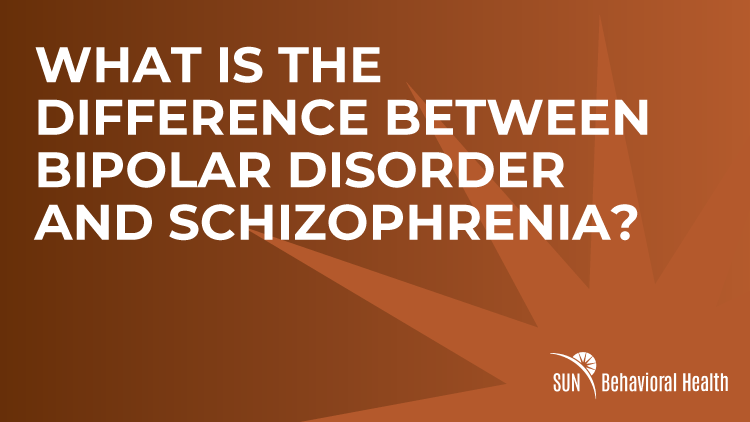Services
- Home
- Mental Health Services
- Who We Treat
- How We Treat
- Patients & Visitors
- About
close

Have you ever gone through a traumatic event, maybe the death of a loved one or losing your dream job? Emotions are running high within you and you feel like you are losing control. On top of everything, time is starting to become a blur. Certain memories seem real but you cannot place them. You remember having conversations but your family and friends have no idea what you are talking about. For those living with bipolar disorder or schizophrenia, psychosis can happen at any point in time.
In Montgomery County Texas, or the greater Houston area, 23,000 residents have a severe and persistent mental health condition. SUN Behavioral Health Houston has treatment programs for lifelong mental health conditions such as bipolar disorder and schizophrenia. But how do you know which treatment is right for you? Let’s look into these conditions further to see the differences between them.
Symptoms of bipolar disorder vary between manic and depressive stages. Manic symptoms include:
In depressive episodes, symptoms include:
In bipolar I disorder, psychosis can occur during manic episodes. Psychosis can include hallucinations, delusions, unusual or disorganized speech or writing, personality changes, and irrational anger or fear. During psychosis, the person is not always aware of what they are doing or saying. After the episode has ended, they have no recollection of what happened.
Schizophrenia is a chronic brain disorder that causes people to not always know which experiences, sights, or sounds are real or which are imagined. People living with schizophrenia tend to be withdrawn and have difficulty expressing emotions. Symptoms include:
Despite negative portrayals of schizophrenia in the media, the disorder rarely causes violent or dangerous behaviors. However, symptoms are not always the same per person.
Bipolar disorder and schizophrenia have similar risk factors. While there is no genetic component found for either condition, they both tend to run in families. Environmental factors such as hormonal changes and high-stress situations can trigger episodes of mania or depression in bipolar disorder and psychotic episodes in schizophrenia. Chemical imbalances can play a role in the development of both conditions because it interferes with how the person’s brain reacts to stimuli. Overwhelming sights and sounds, such as loud music and bright lights, can set off hallucinations or delusions.
Bipolar disorder is classified as a mood disorder whereas schizophrenia is a psychotic disorder. While these conditions can occur together, there is another diagnosis called schizoaffective disorder. Schizoaffective disorder describes the overlapping symptoms of bipolar and schizophrenia which are psychosis with manic and depressive episodes. There are still debates on which diagnosis is considered “correct.” Some clinicians choose to dual diagnose while others will diagnose schizoaffective disorder.
Schizophrenia and bipolar disorder overlap when it comes to symptoms, risk factors, and how they are treated. Both conditions share the symptom of psychosis, but the underlying symptoms differ. Risk factors such as genetics and brain chemistry play a role in both disorders. Even though they are not classified in the same category, treatments for bipolar disorder and schizophrenia are similar and can include:
Mental health disorders are common in adults, but finding care can be a challenge. SUN Behavioral Health Houston has treatment programs for bipolar disorder and schizophrenia regardless of gender or age. We offer adolescent, adult, senior, and women-specific services for mental health. Our services include:
If you or someone you love is living with a mental health condition, reach out to SUN Behavioral Health Houston today. Our master’s level clinicians work with bipolar disorder and schizophrenia in a safe and nurturing environment. Call us at 713-796-2273.
Schizophrenia is a chronic brain disorder that causes people to not always know which experiences, sights, or sounds are real or which are imagined. People living with schizophrenia tend to be withdrawn and have difficulty expressing emotions. Symptoms include delusions, hallucinations, disordered speech, disorganized behavior, and negative symptoms such as lack of hygiene care.
Bipolar disorder is a mental health condition that causes shifts in mood, energy levels, and concentration. Previously known as manic-depressive disorder, bipolar disorder is described as having intense highs and lows. These episodes are referred to as manic and depressive. Manic symptoms include racing thoughts, feelings of jumpiness or on edge, decreased need for sleep, feelings of invincibility or power, engaging in dangerous behavior with no concern for consequences, talking fast, and changing subjects quickly. Depressive symptoms include feelings of sadness or anxiousness, trouble falling asleep and staying asleep, sleeping too much, lack of interest in activities, hopelessness or worthlessness, talking slowly, unable to make decisions and thoughts of suicide.
Bipolar disorder and schizophrenia use similar treatments with medication and therapy. Every person is different and no two treatments for either condition will be the same for everyone.